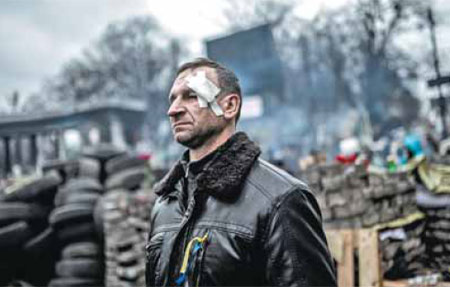Russia, EU offer support for Ukraine
|
A man who was recently injured in clashes during protests looks on in Kiev's Independence Square on Tuesday. Ukraine's interim leader delayed the appointment of a new unity government until Thursday as the country sought to find a way out of its most serious political crisis. Bulent Kilic / Agence France-Presse |
World powers sought to ease tensions over Ukraine on Tuesday as the country's interim authorities grappled with the threat of economic collapse and separatism after the dramatic ouster of president Viktor Yanukovych.
Russia changed its angry tone over the sudden, weekend government change in Ukraine, while senior EU and US diplomats visited the country.
Frantic talks took place between US, European and Russian diplomats as Ukraine appealed for $35 billion in aid to avoid bankruptcy and interim leader Oleksandr Turchynov warned of a secessionist threat.
The European Union had said it stood ready to give conditional financial assistance to Ukraine.
"The real question now is how much of the burden of dealing with Ukraine is going to be European and how much the Europeans are going to be able to slough off onto the American taxpayer," said Wayne Merry, a scholar at the American Foreign Policy Council.
Right now, he said, Ukraine is fairly low on Washington's list of priorities as it faces big problems in Syria, in the Israeli-Palestinian peace process and in nuclear negotiations with Iran.
"In several regions of Ukraine there are very dangerous signs of separatism," Turchynov told Parliament on Tuesday, voicing fears that the pro-Russia east could push for partition after a pro-Western administration took charge of the country following months of anti-Yanukovych protests.
Russia had initially reacted with fury to the weekend's rapid-fire political changes - brought about by last week's clashes that left nearly 100 dead - accusing the new leadership of waging an "armed mutiny".
But on Tuesday, Russian Foreign Minister Sergei Lavrov sought to soften the tone, saying Ukraine should not be forced to choose between Russia and the West.
"We confirm our principled position of non-intervention in Ukraine's internal affairs," Lavrov said in Moscow.
"We are interested in Ukraine being part of the European family, in all senses of the word," he said. "It is dangerous and counterproductive to force Ukraine into a choice."
EU foreign policy chief Catherine Ashton also sought to calm tensions during a news conference in Kiev.
"We offer support, not interference for the future," Ashton told reporters in a bid to downplay claims that the West wants to bring Ukraine into its sphere of influence.
She also stressed "the importance of the strong links between Ukraine and Russia and the importance of having them maintained".
Ashton however offered no concrete commitments of economic assistance, saying only that the International Monetary Fund was "very keen" to meet the future new government.
The tumultuous events of the past week have capped more than three months of relentless protests against Yanukovych's rule sparked by his November decision to spurn a historic pact with the EU in favor of closer ties with Russia.
One of the stars to emerge during this unrest was world champion heavyweight boxer Vitali Klitschko, who became one of the three major protest leaders.
The 42-year-old has managed to use his sports credentials to bridge traditional divides in Ukraine between the more nationalist West and pro-Russia East and South, and as such enjoys wide popularity.
Klitschko announced on Tuesday that he would run for president in the election set for May 25, shortly after the electoral commission officially kicked off the campaign.
While Ukraine's opposition-dominated Parliament delayed on Tuesday the highly anticipated formation of a new government until Thursday, it voted to apply to the International Criminal Court to prosecute Yanukovych over the "mass murder" of protesters.
AFP-AP



















